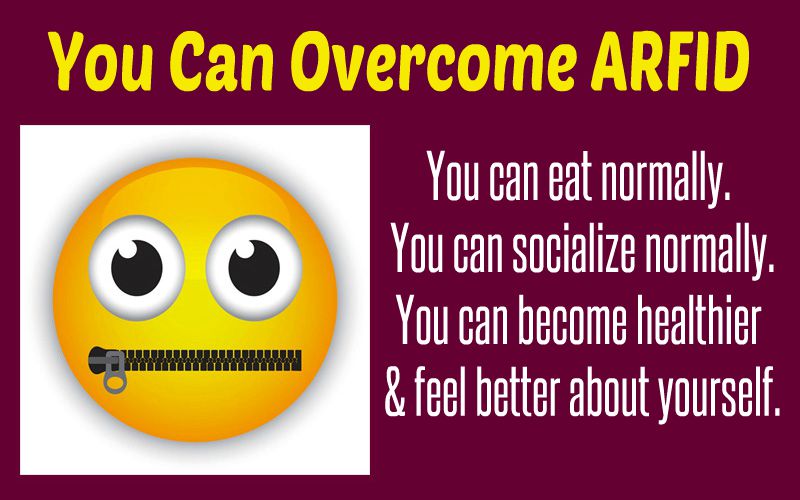Avoidant restrictive food intake disorder treatment (ARFID treatment) is available to help people overcome food phobias. However, there remain serious impediments to successful treatment for most people who are affected by ARFID, formerly know as selective eating disorder.
Is it possible to actually improve your eating habits despite anxiety and fear? Is it even possible to actually cure ARFID permanently and eat “normally” like most of the people around you? The answer to both questions is a resounding “Yes”. But there are some disclaimers on this statement which will be thoroughly explored during the course of this post.
ARFID is curable. I am living proof. I suffered with a really extreme case of selecting eating disorder from early childhood though my late 30s. We are talking almost 4 full decades of life eating only a handful of foods day after day… Although I still have some limited eating habits by conscious choice, I am completely cured on my former eating disorder and have realized just how much better life can be when you open yourself up to culinary adventures.
This post will explore facts, options, opinions and experiences with various types of avoidant restrictive food intake disorder treatments. If you are thinking about seeking help, then this is a great place for you to begin your journey…
ARFID Treatment Impediments
While treatment for ARFID is available, there are several major impediments to successful application in the population of people who suffer from avoidant restrictive food intake disorder:
The majority of people who suffer from ARFID actually have no idea what the condition is. Most have never heard the name and have no idea that there is an actual medical diagnosis which describes their finicky eating habits. I never heard of avoidant restrictive food intake disorder or selective eating disorder during the almost 40 years I suffered from it! I simply thought I was weird! I had no luck with diagnostic accuracy on the 2 occasions I was brought to see a doctor about my condition. In fact, these doctors were as clueless as I was about my picky eating. Therefore, the first and most common impediment to successful ARFID treatment is the lack of understanding that a disorder even exists that CAN be successfully treated…

Next, regardless of whether a person recognizes ARFID as a diagnosis or not, most people who suffer from selective eating DO NOT WANT treatment. They have very serious anxiety and fear that causes their peculiar eating compulsions and imperatives in the first place. They do not want to change or feel incapable of change. I always hated my limited eating habits, especially as I got older, but never saw any possible solution for the problem. I was convinced that I would eventually die eating the same few foods I always ate…
In some cases, people do want help for an eating disorder, but do not have access to the help or can not access help due to distance, finance, language barrier or other circumstances.
ARFID Treatment Types
There are only a few effective options when it comes to treating ARFID. As noted above, it is rare for people to actually seek help for selective eating disorder and in cases where they do, treatment still can fail for many reasons. Here are my personal recommendations for avoidant restrictive food intake disorder treatment:
Cognitive behavioral therapy for ARFID is the gold standard for treating this eating disorder. Treatment is arranged through qualified mental healthcare providers and focuses on discovering the causes of fear, addressing these underlying explanations for selective eating, exposing the patient to new foods and helping them to improve their eating habits using many different techniques.
Pharmacological therapy is used in some people and generally consists of various psychoactive drugs. I do not recommend the pharmaceutical path as being necessary, effective or even safe. The drugs used are toxic and are widely used off-label with often devastating consequences to mental and physical health.
Overcoming food fear can be accomplished using a self-help or self-managed program or approach. Some of the best cures actually come about in people who simply want to change and work to accomplish this change, despite the difficulty of the undertaking. My cure for food phobia came about due to the efforts of my wife. I detail the basics of my case in the My Story section and go into great (and humorous) detail in my book My Food Fear. If you suffer from ARFID, you will “see yourself” on every page of my book…
ARFID support groups are available in the real world and online. Support groups are not really meant to resolve selective eating habits, but can provide social support and empathy for people who can benefit from these communal offerings. Personally, I found the environment in some support groups to be detrimental to ending food fears, but this is not a universal occurrence.

Leave a Reply
You must be logged in to post a comment.